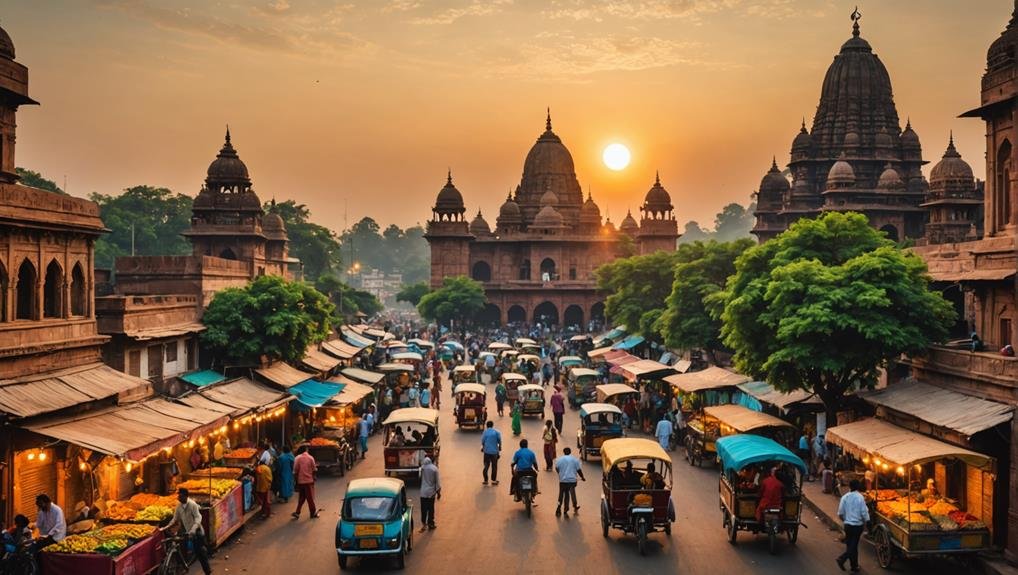Considering a move to India introduces you to a world brimming with diverse cultures, vibrant traditions, and unique opportunities. You’ll find the low cost of living appealing but exploring bustling cities like Mumbai, New Delhi, and Bangalore can be challenging. There’s much to think about, from sorting out visa requirements to securing suitable accommodation. Not to mention the need to adapt to new transportation systems and understand local banking. But before you decide, you might wonder how to handle these changes effectively and what awaits you in this complex yet fascinating country.
Key Takeaways
- India’s low cost of living offers affordable housing, food, and transportation options.
- Major cities like Mumbai, New Delhi, and Bangalore present diverse job opportunities and vibrant cultures.
- Expats should secure an employment visa and familiarize themselves with e-visa requirements.
- Engage with local and expat communities for accommodation and lifestyle advice.
- Health insurance and understanding the healthcare system are essential for safety and well-being.
Pros and Cons of Living in India
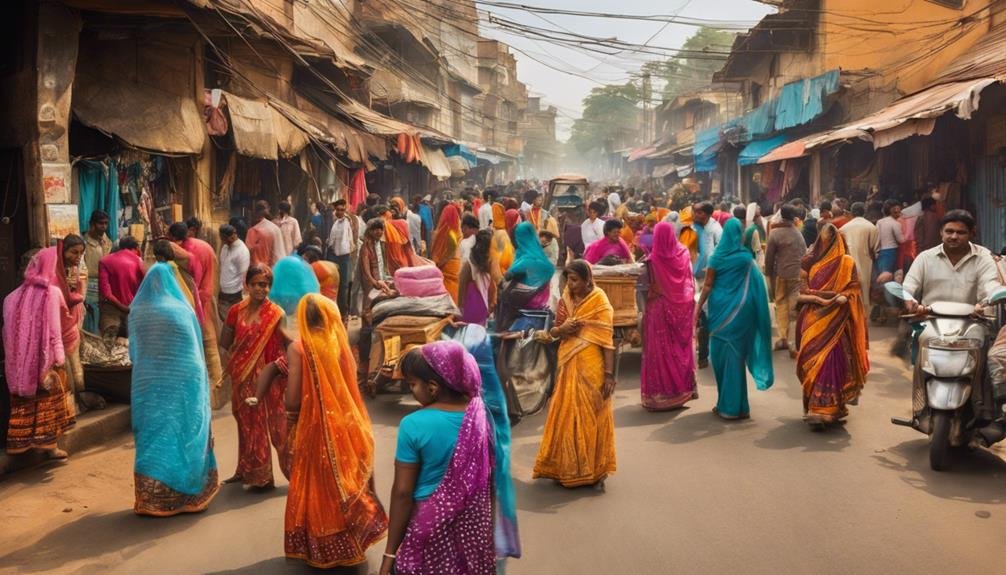
Living in India often blends vibrant cultural experiences and practical challenges. On the plus side, you’ll find the low cost of living appealing, especially if you’re from a Western country. Everything from groceries to housing tends to be more affordable, allowing you to enjoy a comfortable lifestyle without breaking the bank.
However, major cities like Delhi, Mumbai, and Bangalore have their own set of difficulties. Traffic congestion is a significant issue, often leading to long commutes and added stress. Pollution is another major concern in these urban areas, affecting air quality and potentially impacting health.
Despite these challenges, India’s cultural richness is undeniable. You’ll experience diverse traditions, participate in colorful festivals, and explore a rich history that spans millennia. The cuisine alone is a major draw, offering bold flavors and various dishes that cater to all tastes.
Additionally, living in this multicultural environment can be incredibly personally and professionally enriching. You’ll have numerous opportunities to learn new languages, meet people from different backgrounds, and broaden your horizons in ways you mightn’t have imagined.
Transportation Options
Exploring India’s vast landscape is made easier by many transportation options tailored to various needs and budgets. Whether you’re finding your way through the bustling streets of Delhi or planning a scenic journey across states, India’s diverse modes of transport ensure you can reach your destination.
For daily commutes, public transportation is a popular choice:
- Buses: Affordable and extensive, providing connectivity within cities and suburban areas.
- Trains: Ideal for long-distance travel, with an extensive rail network linking major cities and picturesque routes.
- Auto-rickshaws: Perfect for short distances, giving you a unique, immersive experience in the lively Indian streets.
- Ride-sharing services: Uber and Ola offer convenience and comfort, especially for expats and travelers.
Auto-rickshaws are a quintessential part of Indian city life. They’re great for short trips and moving through crowded areas. Remember, fares are usually negotiable, so brush up on your bargaining skills!
If comfort is a priority, consider hiring a private cab or using ride-sharing apps. They’re slightly more expensive but offer a hassle-free experience.
Public transportation in major cities like Delhi and Mumbai is expensive, though often crowded. Regardless of your choice, India’s transportation options make exploring and enjoying all the country offers easy.
Finding Accommodation
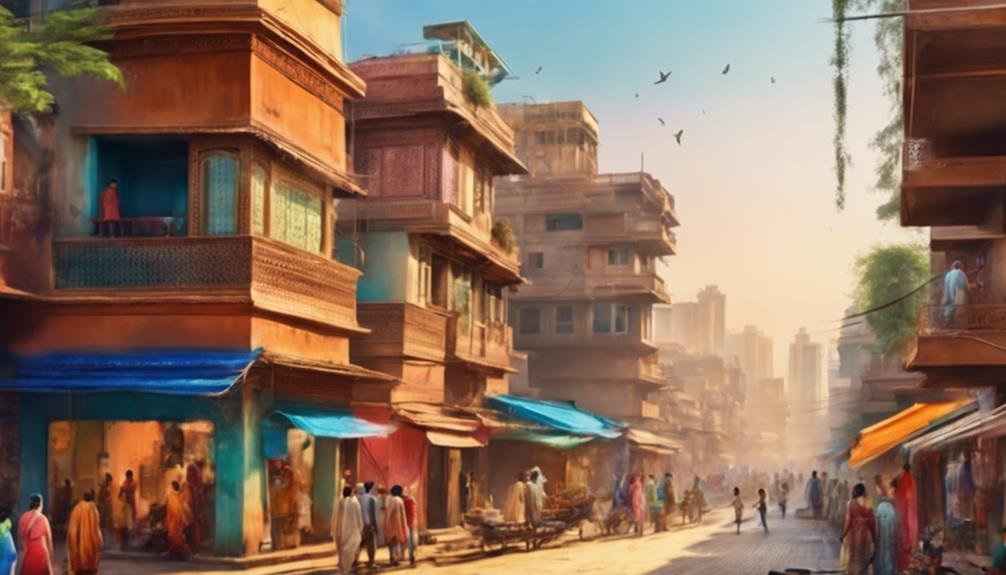
After exploring the diverse transportation options, your next major step is securing a comfortable living place. Moving to India can be exciting, but finding the right accommodation is vital for your well-being. Consider starting with short-term rentals or serviced apartments. They offer flexibility, allowing you to get a feel for different areas before committing long-term.
Engage with locals or join expat groups for valuable advice on housing options. Their insights can help you avoid pitfalls and discover hidden gems.
To streamline your search, it’s also important to compile a list of your preferences, including location, amenities, and budget constraints.
Negotiating rental prices and terms with landlords or property managers is common in India. Don’t hesitate to discuss and ensure you’re getting a fair deal.
Additionally, seeking assistance from real estate agents or browsing online platforms can introduce you to various housing options suited to your needs.
Visa Requirements
Securing the right visa is crucial for a smooth transition to India, especially for those planning to work. Navigating the visa regulations can be intricate, so it’s important to comprehend your options. For work-related relocation, an employment visa is necessary. This visa requires a work permit and is essential for legal residency and work authorization.
E-visa requirements vary depending on the purpose of your visit and your nationality. While the E-Visa is convenient for short-term stays, it’s unsuitable for all job positions. Certain roles restrict E-Visa eligibility, so check if your job qualifies.
Here’s what you need to know:
- Employment Visa: Essential for those planning to work. Requires a work permit.
- E-Visa Requirements: Vary by purpose and nationality. Restrictions apply to certain job positions.
- Visa Extensions: Necessary for long-term stays. Additional documentation may be required.
- Visa Regulations: Ensure you’re legally authorized for residency and work.
Understanding these key points will help you prepare for your move and avoid legal complications. Always check the latest visa regulations before making any final plans.
Expat Jobs
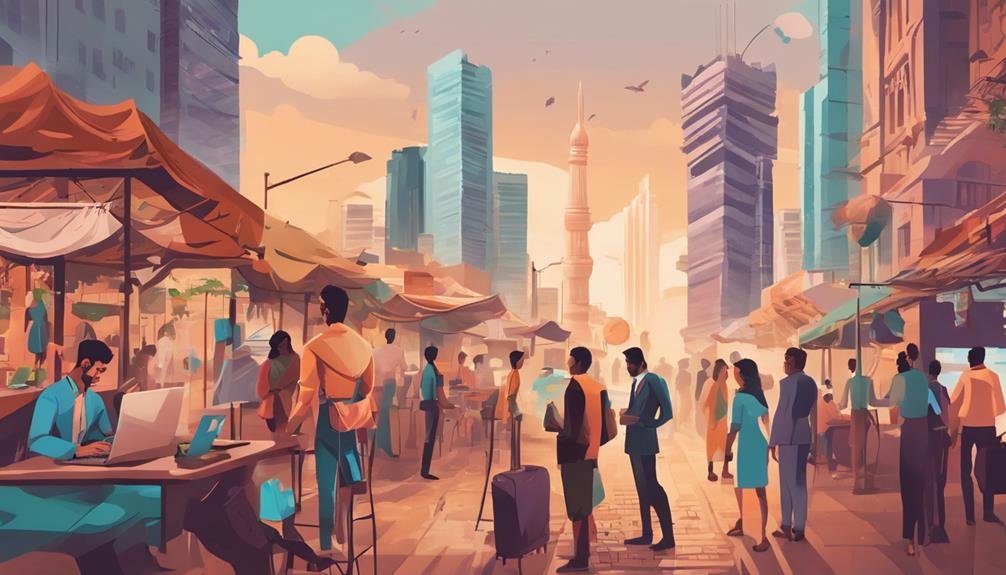
Finding expat jobs in India can be a rewarding challenge, especially in high-demand industries like IT, healthcare, and education. These sectors offer numerous career opportunities for job seekers with the right skills, qualifications, and industry experience.
To legally work in India, you’ll need an employment visa and a work permit, so make sure your job search aligns with these requirements and be aware of E-Visa restrictions that may apply to certain positions.
Networking within the expat community can be incredibly beneficial. Connect with fellow expats who can share insights and possibly refer you to open positions. Online job portals are a great place to start your search, offering a wide range of listings tailored for expatriates.
Please don’t overlook the value of recruitment agencies; they can provide targeted assistance and help you navigate the complexities of the Indian job market.
Working Etiquette
When working in India, it’s important to respect hierarchy by addressing seniors with titles like Sir or Madam. Building strong professional relationships is equally essential, as personal connections often influence business decisions. Don’t forget that while English is commonly used, learning a few local phrases can help establish rapport.
Hierarchy and Seniority Respect
In India, respecting hierarchy and seniority in the workplace is important to maintain harmony and order. If you’re moving back to India or considering living in India, it’s essential to understand the hierarchical structure that governs professional interactions. Here are some key elements to keep in mind:
- Always address colleagues and superiors with appropriate titles like Sir or Madam.
- Recognize that seniority plays a significant role in decision-making processes.
- Acknowledge and respect the input of senior colleagues during discussions.
- Building relationships with senior colleagues and effective communication are important for career advancement.
When you enter an Indian workplace, you’ll notice that the hierarchical structure is deeply ingrained in the culture. This can differ from what you’re used to, especially if you’re moving back to India after spending time abroad. Nevertheless, adapting to this structure is crucial for fostering a positive work environment.
Addressing your superiors with the proper titles shows your respect and acknowledgment of their experience and position.
In discussions, always give importance to the opinions of senior colleagues. Their experience is highly valued, and their insights often shape the final decisions. Understanding and adhering to these practices will help you navigate the professional landscape effectively while living in India.
Building Professional Relationships
Understanding the significance of hierarchy and seniority respect sets the stage for building strong professional relationships in India. When you move back, embracing these cultural norms is essential. Always address colleagues and superiors with titles like Sir or Madam. Networking and relationship-building are key aspects of Indian business culture, where personal connections heavily influence decisions and collaborations.
To establish rapport and trust, start with proper greetings and engage in small talk. Ask about family and personal well-being; it shows genuine interest and helps create a friendly atmosphere. Demonstrating patience, attentiveness, and investing time in these relationships will pay off in the long run.
Adapt to the hierarchical structure by being mindful of communication styles. Seniority often dictates the flow of discussions, so listen more and speak thoughtfully. Show respect through words, actions, and body language.
Banking for Expats
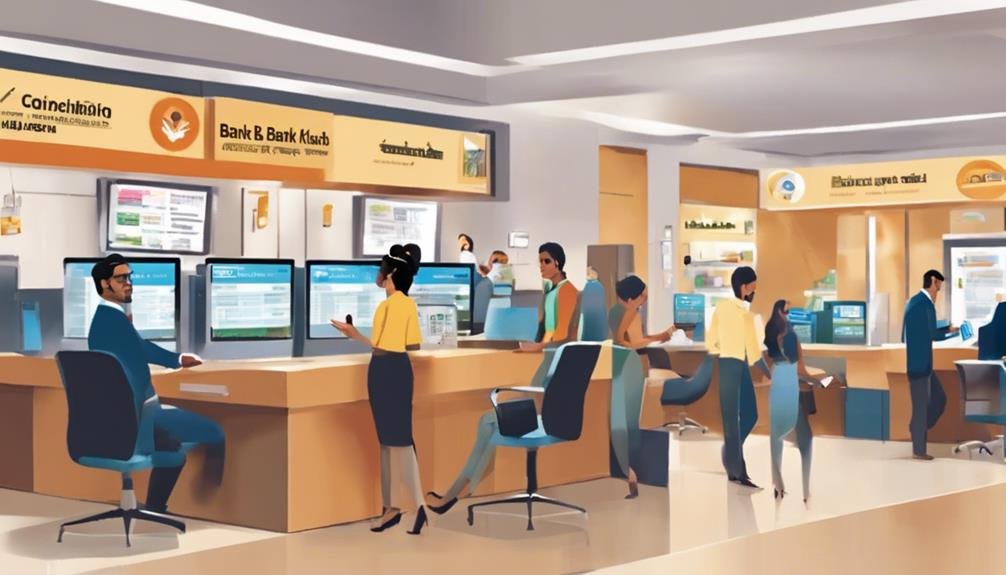
When moving to India, you must navigate the banking system to open an account, convert currency, and manage health insurance. Make sure you have all the required documents, such as your ID and proof of address. Understanding account types and having basic local language phrases will make the process smoother.
Account Types and Requirements
Opening a bank account as an expat in India can seem challenging, but knowing the various account types and their requirements makes the process smoother. Expats can select from savings, current, and NRI (Non-Resident Indian) accounts, each serving different needs.
To open a bank account, you’ll need to meet specific criteria:
- A valid passport and visa
- Proof of residence (local or international)
- An initial deposit
- In some cases, a recommendation from an existing account holder
Different banks might’ve slightly different procedures, but these are the common essentials. Having proof of local address can expedite the process, and some international banks offer accounts with multi-currency options, making it easier to manage funds across borders.
Understanding the requirements and preparing the necessary documents for expats ensures a hassle-free experience.
It’s also advantageous to contemplate whether your bank offers seamless fund transfers and supports international transactions, as these features can make managing your finances in India more convenient.
Currency Conversion Tips
Having sorted out the types of bank accounts and the necessary documentation, the next step is to tackle currency conversion effectively. Considering an international bank account can simplify things when you move to India. These accounts facilitate easier currency conversion, saving you from the hassle of constantly fluctuating exchange rates.
To stay ahead, plan your currency conversions strategically. Use online currency converters or banking apps to monitor real-time rates and execute transactions conveniently. Compare fees and rates offered by different banks or currency exchange services to guarantee you get the best deal. Here’s a quick comparison to guide you:
| Service Type | Exchange Rate | Fees (per transaction) |
|---|---|---|
| Local Bank | Moderate | High |
| International Bank | Competitive | Moderate |
| Online Currency Apps | Real-time | Low |
Also, be aware of any local regulations or restrictions on currency conversion in India. Understanding these rules will help you avoid unnecessary complications.
Health Insurance Options
Exploring health insurance choices as an expat in India can seem daunting, but securing the right plan is vital for your peace of mind. As an expat, you can access extensive health insurance plans encompassing medical expenses, hospitalization, and emergency services. To guarantee quality medical care, consider international health insurance policies that provide coverage in India and globally.
When choosing a health insurance plan, keep an eye out for:
- Coverage for pre-existing conditions: It is important to avoid unforeseen medical costs.
- Maternity benefits: Particularly crucial if you’re planning to start or expand your family.
- Outpatient services: Includes regular physician visits, medications, and minor treatments.
- Customizable plans: Personalize your coverage to suit your specific needs and preferences.
Comparing different health insurance options is essential. Seek plans that offer thorough coverage without straining your finances. Some providers even permit you to personalize your plan, guaranteeing you only pay for your requirements.
Health and Safety
Understanding the health and safety landscape is vital when moving to India. If you’re moving from the US, you’ll notice that India’s healthcare system is a mix of public and private facilities, varying quality across regions. To this end, securing health insurance is important to cover medical expenses.
Be aware of common health risks like water and foodborne illnesses, which can be avoided by sticking to bottled water and eating at reputable places. Pollution-related issues, especially in major cities, may affect respiratory health, so consider wearing masks and air purifiers. Additionally, tropical diseases like dengue and malaria are prevalent, making vaccinations and mosquito repellents important.
Safety in India also requires vigilance. Petty crimes like pickpocketing can occur, so stay alert and avoid displaying valuables. Road accidents are common due to varying traffic conditions and driving habits, so practice defensive driving or hire a trusted driver.
Natural disasters, such as monsoons and earthquakes, necessitate preparedness; keep emergency supplies and contacts handy. Always carry a list of emergency contacts, local hospitals, and necessary medications to ensure you’re ready for any situation. By staying informed and prepared, you can confidently navigate India’s health and safety landscape.
Cultural Adjustment
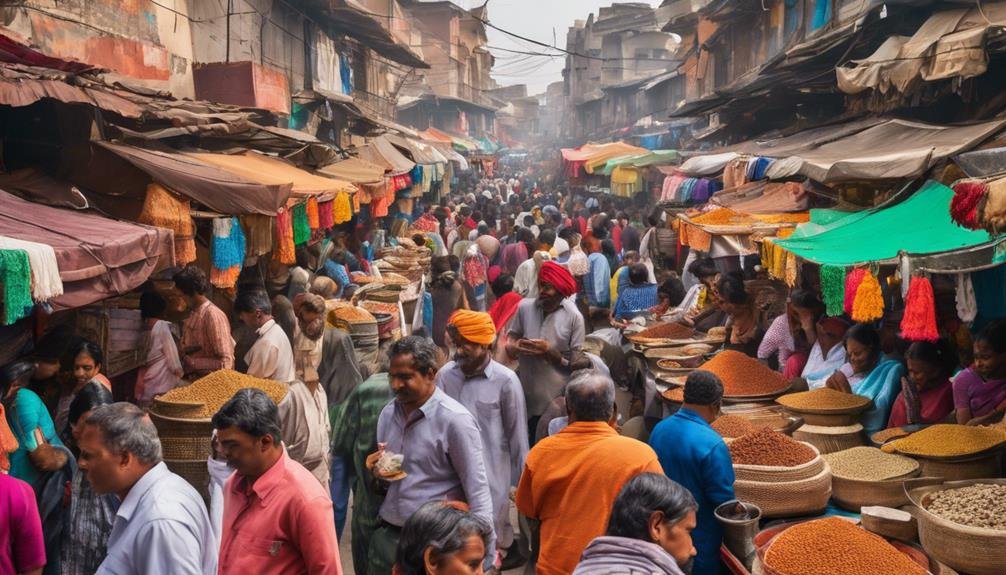
Adapting to the cultural landscape in India can be both challenging and rewarding. When relocating to India, you’ll navigate an intriguing blend of languages, traditions, and customs. Embracing this diversity is essential for a successful cultural adjustment.
To ease your shift, consider the following:
- Respect Hierarchy: Understanding and honoring social hierarchies in family and professional settings is vital.
- Engage Locally: Building relationships and networking with locals can provide invaluable insights and support.
- Celebrate Festivals: Celebrating vibrant festivals and rituals will enhance cultural immersion.
- Taste the Cuisine: Exploring India’s diverse cuisine is a culinary delight and a cultural experience.
Family values play a significant role in Indian society, and acknowledging this will help you integrate more smoothly.
Patience and open-mindedness are your best allies as you encounter new social norms. Remember, cultural adjustment is a gradual process that involves consistently learning and adapting.
Popular Cities
After understanding cultural adjustment, you’ll likely want to know more about where to settle in this vast and diverse country. Moving from the US to India can be an exciting adventure, and choosing the best place to live is pivotal. Here are some popular cities that cater to various lifestyles and professional needs.
Bangalore is often called the Silicon Valley of India. It’s a top choice for IT professionals looking for career opportunities and a vibrant cultural scene.
Mumbai is the financial capital of India. It offers a thriving entertainment industry and diverse culinary experiences, making it ideal for those who love the hustle and bustle of city life.
New Delhi, the capital city, showcases a mix of historical monuments, modern infrastructure, and bustling markets, perfect for history buffs and urban explorers.
Chennai is known for its beautiful beaches and rich heritage. It’s a hub for technology and automobile industries, offering a balance of work and leisure.
Hyderabad is famous for its historic landmarks and biryani. It’s a growing IT and pharmaceutical hub, making it a great option for professionals in these sectors.
| City | Notable Aspect | Industry Focus |
|---|---|---|
| Bangalore | Silicon Valley of India | IT |
| Mumbai | Financial Capital | Entertainment, Finance |
| New Delhi | Historical Monuments | Government, Infrastructure |
| Chennai | Beautiful Beaches | Technology, Automobile |
| Hyderabad | Historic Landmarks | IT, Pharmaceuticals |
Choosing the right city can make your move from the US to India smoother and more enjoyable.
Conclusion
Moving to India offers a unique blend of challenges and rewards. You’ll experience a rich cultural tapestry, diverse opportunities, and a low cost of living. Finding your way around transportation, securing accommodation, and understanding visa requirements will be essential. Proper planning allows you to adapt to the vibrant lifestyle and enjoy your new adventure. Embrace the change, explore popular cities, and immerse yourself in India’s dynamic environment. It’s an exciting journey that promises personal growth and unforgettable experiences.
FAQs
1. Is It a Good Idea to Move to India?
You’ll find cultural adjustment manageable with India’s welcoming communities. Job opportunities abound in various sectors, and you’ll appreciate the affordable healthcare access. Considering these factors, moving to India could be a great idea for many.
2. Can a US Citizen Move to India?
Yes, you can move to India as a US citizen. You’ll need to meet visa requirements and navigate cultural differences. Job opportunities are diverse, so consult the Indian embassy for specific details and necessary procedures.
3. How Much Money Do You Need to Live Good in India?
When considering the cost of living, you’ll find that a comfortable lifestyle in India typically requires a monthly budget ranging from $500 to $1500. Budget planning is essential, but the lifestyle comparison shows significant savings over Western countries.
4. How Much Money Do You Need to Move to India?
You’ll need to factor in visa requirements, shipping costs, and initial housing expenses. The cost of living and cultural adaptation also impact your budget. Comparing international moving services helps. Prices vary, so plan accordingly for a smooth shift.
